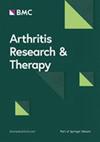粒细胞-巨噬细胞集落刺激因子可能通过影响常规树突状细胞功能参与HLA-B27转基因大鼠脊柱炎的发生
IF 4.6
2区 医学
Q1 Medicine
引用次数: 0
摘要
脊椎关节炎(SpA)是一种慢性炎症性疾病,具有轴向和外周表现。HLA-B27和SpA之间的密切联系已被发现超过50年。值得注意的是,HLA-B27和人β2-微球蛋白转基因大鼠(B27大鼠)出现再现性SpA的表现,简称大鼠SpA。树突状细胞(DC)和CD4 T细胞等抗原呈递细胞是大鼠SpA发展的必要条件。粒细胞巨噬细胞集落刺激因子(GM-CSF)是DC产生和功能的关键生长因子,在SpA期间血清水平显著升高。常规(c) dc可分为与免疫耐受(cDC1)或适应性免疫反应诱导(cDC2)有关的两个亚群。在本研究中,我们旨在确定GM-CSF对B27大鼠模型中与T细胞活化和分化相关的cDC亚群功能的影响。从B27和非转基因(NTG)大鼠的脾脏中分离出cDC亚群,用GM-CSF引物并测试其支持CD4h T细胞分化的能力。对gm - csf引物的cDC亚群进行RNA测序。B27大鼠gm - csf引发的cDC2是产生tnf的促炎性CD4+ T细胞的强诱导剂。相反,对照cDC1需要GM-CSF来支持T细胞增殖,而HLA-B27+ cDC1用GM-CSF引物不能这样做。RNA测序分析表明,HLA-B27的表达促进了两个cDC亚群的内质网应激和未折叠蛋白反应。此外,HLA-B27的表达促进了cDC2对炎症细胞因子的合成,并干扰了cDC1对细胞粘附和活化的调节。总之,我们的研究揭示了GM-CSF在SpA中的双重作用。一方面,GM-CSF促进cDC2的促炎功能。另一方面,cDC1需要GM-CSF来诱导T细胞增殖,而HLA-B27的表达削弱了这一功能。本文章由计算机程序翻译,如有差异,请以英文原文为准。
Granulocyte-macrophage colony-stimulating factor may contribute to spondyloarthritis development in HLA-B27 transgenic rat by affecting conventional dendritic cells function
Spondyloarthritis (SpA) is a chronic inflammatory disorder with axial and peripheral manifestations. A strong association between HLA-B27 and SpA has been known for more than 50 years. Remarkably, HLA-B27 and human β2-microglubulin transgenic rats (B27 rat) develop manifestations recapitulating SpA, referred to as rat SpA. Antigen-presenting cells such as dendritic cells (DC) and CD4 T cells are mandatory to develop rat SpA. Serum levels of granulocyte macrophage-colony stimulating factor (GM-CSF), a key growth factor for DC generation and functions, are significantly increased during SpA. Conventional (c)DCs can be divided in two subsets implicated either in immune tolerance (cDC1) or in adaptive immune responses induction (cDC2). In this study, we aimed to determine the influence of GM-CSF on cDC subsets functions linked to T cell activation and differentiation, in the B27 rat model. cDC subsets were isolated from spleens of B27 and nontransgenic (NTG) rats, primed with GM-CSF and tested for their ability to support CD4h T cell differentiation. RNA sequencing was performed on GM-CSF-primed cDC subsets. GM-CSF-primed cDC2 from B27 rat were strong inducers of TNF-producing proinflammatory CD4+ T cells. In contrast, whereas control cDC1 required GM-CSF to support T cell proliferation, HLA-B27+ cDC1 primed with GM-CSF failed to do so. RNA sequencing analysis demonstrated that HLA-B27 expression promoted endoplasmic reticulum stress and unfolded protein response in both cDC subsets. In addition, HLA-B27 expression promoted inflammatory cytokine synthesis by cDC2 and a signature interfering with regulation of cell adhesion and activation in cDC1. Altogether, our study reveals a dual role of GM-CSF during SpA. In one hand, GM-CSF promotes proinflammatory functions of cDC2. On the other hand, GM-CSF is required for cDC1 to induce T cell proliferation, and those functions are blunted by HLA-B27 expression.
求助全文
通过发布文献求助,成功后即可免费获取论文全文。
去求助
来源期刊

Arthritis Research & Therapy
RHEUMATOLOGY-
CiteScore
8.60
自引率
2.00%
发文量
261
审稿时长
14 weeks
期刊介绍:
Established in 1999, Arthritis Research and Therapy is an international, open access, peer-reviewed journal, publishing original articles in the area of musculoskeletal research and therapy as well as, reviews, commentaries and reports. A major focus of the journal is on the immunologic processes leading to inflammation, damage and repair as they relate to autoimmune rheumatic and musculoskeletal conditions, and which inform the translation of this knowledge into advances in clinical care. Original basic, translational and clinical research is considered for publication along with results of early and late phase therapeutic trials, especially as they pertain to the underpinning science that informs clinical observations in interventional studies.
 求助内容:
求助内容: 应助结果提醒方式:
应助结果提醒方式:


